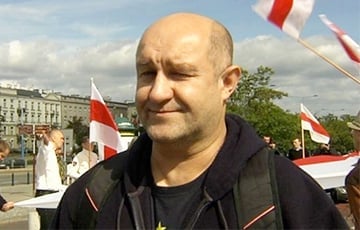Natallia Radzina: This Is Lukashenka's Last Performance
33- 25.10.2024, 11:21
- 45,076

The situation will change dramatically.
On January 26, 2025, the so-called "presidential elections" were announced in Belarus. In fact, they are early. Lukashenka has already announced his participation. Why is the dictator in such a hurry? Editor-in-Chief of Charter97.org Natallia Radzina told about this in an interview on the YouTube channel of the famous journalist Evgeny Kiselev:
— First of all, this is by no means an election. This is another farce. Lukashenka has been falsifying "elections" throughout the 30 years of his rule. The next performance, which he intends to hold on January 26, 2025, is sure to be his last. Lukashenka understands this perfectly well. I am convinced that the dictator does not have another five years. The dictatorship in Belarus will collapse much earlier. Why is he in a hurry? This shows Lukashenka's fear. He realizes that he has little time left. The "elections" will be held early, at least six months earlier. Lukashenka has serious health issues, we can see all this clearly. Apparently, he decided to hold the so-called elections while he stands on his feet. Also, the dictator is forced to hurry by the pressure that is exerted on him from all sides.
The Belarusian journalist criticized the "plan" of Tsikhanouskaia's office for the so-called elections:
— Of course, Tsikhanouskaia has no influence on the situation inside the country. She imitates activity. After the announcement of the date of the "election", Tsikhanouskaia's office called for "voting against everyone". This is for sure benefits the actual power. I believe that these "elections" should be completely ignored. When you call on people to vote against everyone, you are ensuring the turn out for the authorities. You are calling on Belarusians to come to the polling stations, legitimizing this farce and providing a picture for propaganda TV channels. Then Lukashenka draws a figure of 80%. I urge Belarusians not to participate in the "elections", to ignore them as much as possible. If you are forced (we understand that the authorities will use the administrative leverages), it is better to spoil these ballots. It is clear that today it is difficult to talk about an open protest against the authorities, given the level of repression, but I believe that every citizen of Belarus must ignore these "elections".
We are well aware that the numbers have already been prepared. For sure, Lukashenko will want to draw about 80%. Perhaps more, because Putin had 87% in the last "election". It makes no difference. But it is very important that there will be empty polling stations on the day of the "elections". Yes, people will be driven to early voting, because it is easier to send a person from the workplace, but on the day of the "election" we are able to make it empty. This is how Belarusians will express their protest against the dictatorship. It's absolutely safe.
Can there be a technical candidate in these “elections” who can be supported by the opposition? Natallia Radzina believes that this option is excluded:
— Such a scenario is impossible in 2025. Today, there are not even spoilers on the horizon who will dare to go with Lukashenka to these "elections". But I think there will be a few people who will look unprofitable against the background of the dictator. Although now any candidate will look more advantageous, Lukashenka is so decrepit and weak. But they will be absolutely safe people for him. It is impossible to talk about voting here, you need to ignore it.
It makes sense to participate in the "elections" if a protest is organized after them. We should deprive the dictator of turnout.
The Editor-in-Chief of Charter97.org is sure that Lukashenka does not have the opportunity to stay in power for five years:
— His dictatorship has run out of resources, and Moscow is running out of resources. I believe that very serious events are waiting for us in the near future. Changes in Belarus will happen much earlier than in five years. I see this in the mood of the Belarusian establishment, which today, of course, is intimidated and cannot raise its voice against Lukashenka, but it is obvious that they are not satisfied with the situation that has developed in the country.
They see the threats that are growing from Moscow in connection with the war against Ukraine and in connection with Putin's plans to expand the empire. The establishment and business are frightened by the level of lawlessness in Belarus. After all, those power structures (in fact, gangs) that throw political prisoners into prisons, carry out repressions against both businessmen and officials. Like in 1937. Lukashenka has untied the hands of these security forces, they are allowed everything today. This state of affairs does not suit many people. Therefore, dissatisfaction among both the establishment and business is serious today.
Natallia Radzina believes that Russia will weaken and begin to fall apart, which will lead to fundamental changes in Belarus. Arguing her position, she cites the example of the USSR:
— Let's recall the all-Union referendum on the preservation of the USSR, which was held on March 17, 1991. It was held in 9 of the 15 Union republics. More than 70% of Belarusian votes for preserving the USSR were falsified. A few months later, in August of the same year, the USSR ceased to exist.
It's a matter of opinion. Today I see a weak and decrepit Lukashenka, a weak and old Putin. I know that Russia's resources are absolutely exhausted.
Let us recall the remarkable Soviet dissident Andrei Amalrik, who in 1969 wrote the essay “Will the Soviet Union Survive until 1984?”. In his subsequent book, The Dissident's Notes, I read how his friends reacted to the work. He was told that "this will never happen", "the Soviet Union will exist for another thousand years." Andrei Amalrik conducted a brilliant analysis of what the Soviet Union was and what the Soviet system was. He saw its weakness and vulnerability. He saw that it would not be able to exist for a long time in isolation and in an arms race. He saw the mood of society, he used the term "doublethink" to describe it. Andrei Amalrik wrote that people do not support the Soviet regime. He predicted an imminent war. True, he was mistaken, it was not with China, but in Afghanistan. And the Soviet Union collapsed. Yes, not in 1984, but in 1991, but the destruction began in 1985, when the "perestroika" came.
I believe that the current situation in modern Russia is the same. We are all ipso victims. Russian propaganda is working. Its purpose is to convince people that "the regime is strong", "Putin will be forever", "Russia will be forever". No, the empire will collapse, I am convinced.
Evgeny Kiselev agreed with this statement and expressed the opinion that many pessimistic forecasts today are associated with "inertia of perception":
— If you recall those years, I am ready to honestly confirm that even when the failed putsch occurred, when the independence of Latvia, Lithuania and Estonia was officially recognized, I remember perfectly well that many people could not assume that the USSR would collapse in a few months. Everyone thought that a certain formula for a renewed union would be found, that it would not be the USSR, but another abbreviation. And when democratic events were at their peak — 1989, the first congress of people's representatives, the height of Gorbachev's reforms — no one exactly assumed that the USSR would collapse in 2.5 years. It was the inertia of perception. I believe that today many are in its captivity, which leads to a sense of the inevitability of the current existence, which allegedly will continue for another 15-20 years.
Natallia Radzina pointed to the direct symptoms that the Putin and Lukashenka regimes are facing serious problems:
— Russia is running out of human resources. What's the reason to invite North Korean soldiers? Obviously, they cost the Russian regime less than their own contract soldiers, who are paid colossal salaries. And this means that the money is running out. Sectoral sanctions imposed by the West are doing their job. Even if they are bypassed through third countries, the regime incurs huge costs. Supporting terrorist regimes around the world is also very costly for Putin.
As for the situation in Belarus, I can say that subsidies from Moscow have decreased significantly, and Lukashenka is accustomed to living exclusively on Russian money, which has been flowing to Belarus for 30 years. And now — that's it, the tap is closed. Western sanctions are in place, primarily against oil products that do not go to Europe and the main Ukrainian market is lost. Potash and nitrogen fertilizers also do not flow in the same way as before the imposition of sanctions. This all seriously hits the regime. I see that today it is in a situation of half-disintegration, and society hates the dictator. Yes, today it is possible to keep people under control with the help of punitive structures, but after all, these oprichniks are to their paychecks, they are used to living well.
Natallia Radzina believes that Moscow, in any case, will not be able to prevent Lukashenka's regime change:
— I think that even the establishment is against Lukashenka's participation in these "elections". In addition to being old and decrepit, the dictator is absolutely anachronistic. He is not able to offer any alternative to the development of the country, Lukashenka leads it to a dead end. The total dependence that he has on Moscow is ruining today's Belarus. I see that a significant part of officials understand this. There is a change of generations, completely different people come who are much younger than Lukashenka and would not like to lose the country and their position in the power structures. I believe that they think that the authorities in Belarus need to change and negotiate with the West and the opposition in order to find a way out of this situation.
In the future, a transitional government may be created, which will have to seek help from the West. Even in case of a coup from the top before the weakening of Moscow, the coalition government, which should include the establishment, political prisoners released from prison and part of emigration, can call on the international community to introduce peacekeeping forces in Belarus under the auspices of NATO or the UN, as peacekeeping forces were introduced in Kosovo. They have KFOR, and we may have BYFOR.
Will Russia be able to resist? And how much does the Russian Federation liberate the Kursk region? So, their own country. They could not do it with their resources. They abandoned the Chechens — they fled, now they are sending the North Koreans. How long will they last? Let's not exaggerate the power of Russia. We need to act without looking at Moscow. Yes, we need to understand the complexity of the situation, but act in the interests of our country. Lukashenka's regime will inevitably collapse.











